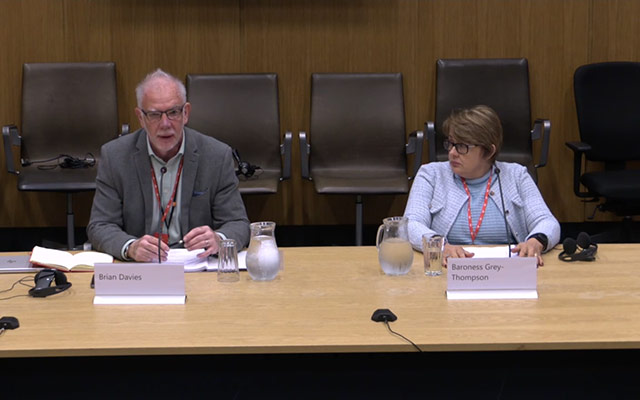Politics
More cuts could have devastating impact, Sport Wales warns

SPORTS WALES warned any further cuts to its budget by the Welsh Government next year would have a potentially devastating impact.
Brian Davies, chief executive of Sport Wales, and Tanni Grey-Thompson, its chair, gave evidence to a Senedd inquiry about the impact of culture funding cuts on October 9.
Delyth Jewell, who chairs the culture committee, asked what would happen if cuts to Sports Wales’ budget were repeated in next year’s budget which will be published on December 10.
“It would be a big problem,” Mr Davies replied, saying Sport Wales was fortunate this year to be able to absorb the 10.5% cut from the Welsh Government.
He said further reductions would pose an “existential” challenge for smaller governing bodies that are funded by Sport Wales, which is responsible for developing and promoting sport.
Mr Davies suggested this year’s cut has impacted participation and equality, adding that Sport Wales has tried to minimise this by only passing on a 3.5% cut to partners.
He told the committee: “Cutting sport, which is a fantastic tool for the preventive health agenda, is a false economy … for every £1 of public money spent on sport and physical activity, there’s a £4.44 return in terms of social investment for Wales.”
Sport Wales’ written evidence said the £2.5m cut to its budget in 2024/25 is estimated to have led to a loss of £11.1m in terms of social return on investment.
Baroness Grey-Thompson said: “We might not see the impact of it for a couple of years actually … but there will be an impact in terms of what people are able to deliver.”
Pressed by Labour’s Lee Waters about suggestions of an “instinct to protect elite sport first”, Mr Davies said: “No, I don’t think that’s fair – in fact I know that’s not correct.
“Governing bodies, in the main … have such a broad range of responsibilities for their sport in the sector – elite sport is only one. There’s an awful lot that goes on.”
Baroness Grey-Thompson added that Sport Wales has moved away from demanding medal targets because it drives a culture that impacts grassroots sport.
The Paralympian said: “Partners understand that if you don’t develop that broad base, you’re not going to get the medallists.”
She stressed the importance of physical activity, calling for a focus on young people and “harder-to-reach, easier-to-ignore” groups to develop good patterns of behaviour.
Mr Davies agreed about the importance of prevention as he cautioned that Sport Wales is not as entwined as it should be with health and education.
Quizzed about the impact of council cuts, such as to leisure centres, Mr Davies said facilities are a critical issue as he pointed to a Sport Wales energy grant scheme.
He agreed about the role schools could play in opening up their facilities out of hours, particularly in rural Wales, but he warned Sport Wales has “hit a bit of a brick wall”.
Asked about accessing funding from trusts or foundations, Mr Davies said income generated by Sport Wales could be clawed back by the Welsh Government under its remit letter.
He told committee members: “It is an interesting area that we haven’t progressed and I don’t think any other sports council has either.”
Baroness Grey-Thompson said sponsorship for governing bodies is “considerably lower than you might imagine”, with a drop off after the 2012 Olympics and Paralympics.
Mr Waters raised concerns that standalone Welsh bodies may find it increasingly hard to sustain operations, with some potentially reverting to GB or England and Wales bodies.
Pressed about the Welsh Rugby Union, Mr Davies welcomed progress on governance, saying Sport Wales has reinstated funding that was withdrawn two years ago.
Community
Cilgerran Church in Wales school petition to be heard

A PETITION opposing proposed changes for a north Pembrokeshire school is to be heard by councillors later this week.
At last May’s meeting, Pembrokeshire County Council considered a report of the School Modernisation Working Group which outlined the findings of a review of education provision in the Preseli area.
A later July meeting backed a general consultation to discontinue Cilgerran Church in Wales Voluntary Controlled School, and to establish it as a 3-11 community school.
“In particular, the review considered the extent of surplus school places in the area, set against a significant decline in the pupil population,” the council in its consultation has said.
The consultation closed on January 30.
Hundreds have opposed the proposed changes, with a petition, on the council’s own website opposing the changes recently closing after gaining 391 signatures.
Any petition of more than 100 signatures triggers a debate at one of the council’s scrutiny committees, in the case of Cilgerran that debate taking place at Pembrokeshire County Council’s February 5 schools and learning overview and scrutiny committee.
The Cilgerran e-petition, created by Louise Williams, raised concerns including the school could become part of a federation, a loss of permanent head teacher on site, a shared head teacher would have to oversee several schools, loss of funding control and the ability to maintain the school’s current healthy and stable funding, and a loss of commitment to the church, in turn could impact on the school’s and pupils values, beliefs and cultural beliefs.
It said: “Ysgol Cilgerran VC school has strong links with the Church community in Cilgerran and we believe this will have a negative impact on the children who attend the school, the community of Cilgerran and the links between the two.
“We are proud of our school ethos and values which are strengthened by our links with the church. The school has close and strong relationships with our Church in Wales federation governors one of which is also our safeguarding governor.
“Our Church Federation governors work closely with the school and are regular visitors to the school and the children. They provide vital support and guidance to the school and have a positive impact on the Children’s education. We believe these links will be weakened by this proposal to remove our VC status and we believe this is an un-necessary action.”
The proposals for Cilgerran are part of a wide range of potential education changes in the county.
Two petitions, opposing the potential closures of Manorbier and Ysgol Clydau schools, were recently heard at full council and a further petition opposing the potential closure of Stepaside School has recently been launched, which has generated enough support to be heard at a future council meeting.
Crime
Welsh Lib Dems urge ministers to rethink rates relief for struggling pubs and cafés

Calls grow for Welsh Government to match support offered to English venues
THE WELSH LIBERAL DEMOCRATS have urged the Welsh Government to review its business rates policy, warning that scaling back support for pubs and hospitality risks further closures across towns and villages.
Party leader Jane Dodds, who represents Mid and West Wales in the Senedd Cymru, said ministers should act quickly to protect local venues after additional support for pubs and music venues was announced for England by the UK Government.
The measures announced by the Chancellor do not automatically apply in Wales, leaving uncertainty over whether similar help will be introduced here.
Hospitality businesses across Pembrokeshire and Carmarthenshire have already reported rising energy bills, higher wage costs and reduced footfall since the pandemic. From April, current business rates relief is expected to be reduced, a move the Liberal Democrats say could place Welsh firms at a disadvantage compared with competitors over the border.
Dodds said that pubs, cafés and restaurants form “the heart of our communities” and warned that withdrawing relief now would be “a serious mistake”.
She told the Senedd that support “cannot stop at pubs alone” and should extend to the wider hospitality sector, including restaurants and family venues that rely heavily on seasonal trade and tourism.
“When questioned, the First Minister said she needed to examine the details of the English package before committing to anything similar for Wales,” Dodds said. “Without urgent action, we risk losing viable, well-loved businesses that communities simply cannot afford to lose.”
The party is also calling for UK-wide action, including a temporary reduction in VAT for hospitality and tourism, funded by a windfall tax on large banks.
However, Welsh Government sources have previously argued that decisions on rates relief must be balanced against pressures on public finances, with ministers required to prioritise health, education and other frontline services within a fixed budget. They have said any additional support would need to be affordable and targeted.
Industry bodies have echoed concerns about the challenges facing the sector. Trade groups say many independent pubs and cafés continue to operate on tight margins, particularly in rural areas where they serve as community hubs as well as businesses.
Local operators say clarity is now key, with decisions on staffing, stock and opening hours often planned months in advance.
With the next financial year approaching, hospitality owners will be watching closely to see whether Wales mirrors England’s support – or leaves businesses to absorb the extra costs alone.
international news
Mandelson quits Labour over Epstein controversy

Former cabinet minister says stepping down is ‘in best interests of the party’ as questions raised over historic payments
LORD MANDLESON has resigned his membership of the Labour Party, saying he does not want to cause “further embarrassment” following renewed controversy over his past links to convicted sex offender Jeffrey Epstein.
The former cabinet minister and one-time UK ambassador to the United States confirmed his decision in a letter to Labour’s general secretary after fresh documents released by the US Department of Justice appeared to reference him in connection with Epstein’s finances.
The files suggest that three payments of $25,000 — totalling $75,000, about £55,000 at today’s exchange rates — were allegedly made to Peter Mandelson in 2003 and 2004.
Lord Mandelson said he had “no record or recollection” of the transactions and believes the allegations may be false, but intends to investigate the matter himself.
In his resignation letter, he wrote that he felt “regretful and sorry” to be linked again to what he described as the “understandable furore” surrounding Epstein.
He added that stepping down from party membership was the responsible course of action while he reviewed the claims.
“I do not wish to cause further embarrassment to the Labour Party,” he said. “I have dedicated my life to the values and success of the party and believe I am acting in its best interests.”
Ambassador role ended
Lord Mandelson had been appointed the UK’s ambassador to Washington by Prime Minister Keir Starmer in December 2024.
However, he was removed from the post last year after earlier revelations about his past friendship and contact with Epstein, including emails showing communication after the financier’s 2008 conviction.
The latest release of files has also included photographs said to show Lord Mandelson alongside an unidentified woman. He said he could not place the location or circumstances of the images.
There is no suggestion that appearing in the documents or photographs indicates criminal wrongdoing.
‘Deep regret’
Earlier this weekend, Lord Mandelson reiterated his regret for ever having known Epstein and apologised “unequivocally” to the women and girls who suffered abuse.
“I want to repeat my apology to the women and girls whose voices should have been heard long before now,” he said.
Epstein died in prison in 2019 while awaiting trial on sex trafficking charges, but investigations into his network of associates continue to generate political fallout on both sides of the Atlantic.
Labour has not yet issued a detailed statement beyond confirming it had received Lord Mandelson’s resignation.

-

 Health5 days ago
Health5 days agoConsultation reveals lack of public trust in health board
-

 News6 days ago
News6 days agoCaldey still unsafe, survivors warn — despite Abbey’s reform claims
-

 Community6 days ago
Community6 days agoPembrokeshire students speak at national Holocaust Memorial Day event
-

 News1 hour ago
News1 hour agoPrincess of Wales visits historic Pembrokeshire woollen mill
-

 News6 days ago
News6 days agoKurtz raises Gumfreston flooding in the Senedd as petition deadline nears
-

 Crime7 days ago
Crime7 days agoMan denies murdering brother as jury hears of ‘ferocious attack’ at Morriston flat
-

 Crime4 days ago
Crime4 days agoPembroke man accused of child sex offences sent to Swansea Crown Court
-

 Community5 days ago
Community5 days agoCampaign to ‘save’ River Cleddau hits over 2,200 signatures


























